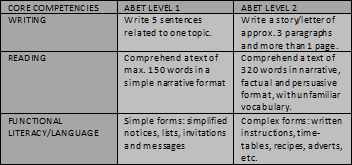Adult Basic Education and Training
WHO IS IT FOR?
Skye English offers the ABET training programme in the subjects of Mathematics and English Communication (and Economic and Management Services) to:
- School learners: As additional tuition to elevate competence to the expected level of the learner’s existing grade. (i.e. as a catch-up course)
- Adults: Perfect for international speakers of other languages, and South Africans whose mother tongue is not English.
THE NQF AND OUTCOMES-BASED EDUCATION AND TRAINING
The National Qualifications Framework (NQF) is the framework in which unit standards and qualifications are developed for all learning areas (subjects) in South Africa. The NQF has eight levels, and is divided into bands, the lowest being GET (General Education and Training), and the middle being FET (Further Education and Training).
The following diagram shows how the levels on the NQF relate to school equivalence, and where the ABET levels fit in:

WHAT ARE OUTCOMES AND UNIT STANDARDS?
Outcomes are the results of learning processes, and refer to knowledge, skills and attitudes – what a learner can do at the end of that level of learning.
These critical outcomes are important, as they act as criteria for examination and promotion to higher levels of learning; and emphasises active and critical learning, rather than passive.
Unit Standards are written by stakeholder groupings, and registered by the South African Qualifications Authority (SAQA). A Unit Standard is a document giving the required competence that learners have to meet specific levels, competence of which is made up of smaller outcomes.
Unit Standards are the building blocks for qualifications, and act as credits in the pursuit of a qualifiction. (Unit Standards are also used to give guidance to learning programme developers and material writers.) An example of a Unit Standard is as follows:

WHAT ABET LEVEL SHOULD I BE ENROLLING ON?
The table below presents the main difference between ABET Levels 1 and 2 in English Communication. Although it may serve as an indication, ABET demands precision, and Placement Assessment is a 2-hour pre-test that places applicants on their appropriate level of entry. This results in learning comfort, and no wasting of time and money.

ADVANTAGE OF ABET
When considering that the entry point of ABET Level 1 is Grade 3, and the exit point of ABET Level 2 is Grade 5, this indicates a substantial increase in skill obtained in one ABET Level.
This ‘fast tracking’ is achievable through clear learning criteria, time-efficient learning sessions, small classes and personal attention, and mature learner attitude.
COURSE DURATION
120 Hours / ABET Level / Subject
This may be undertaken as:
Full Time:
20 hours per week (6 weeks) Daily: 09:00 - 13:00 (Mon to Fri)Part-Time:
6 hours per week Mon & Wed / Tues & Thurs (6-8pm), and Saturday mornings (2 hours)




















